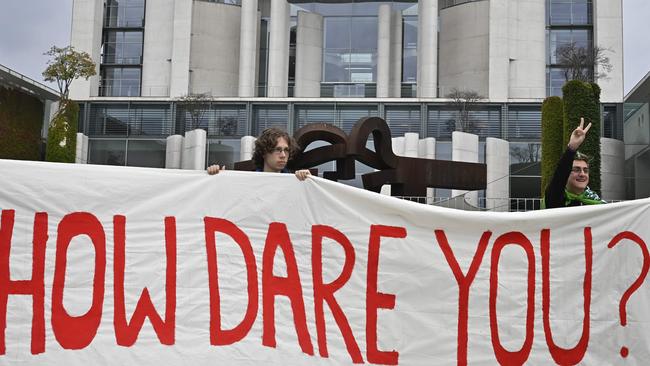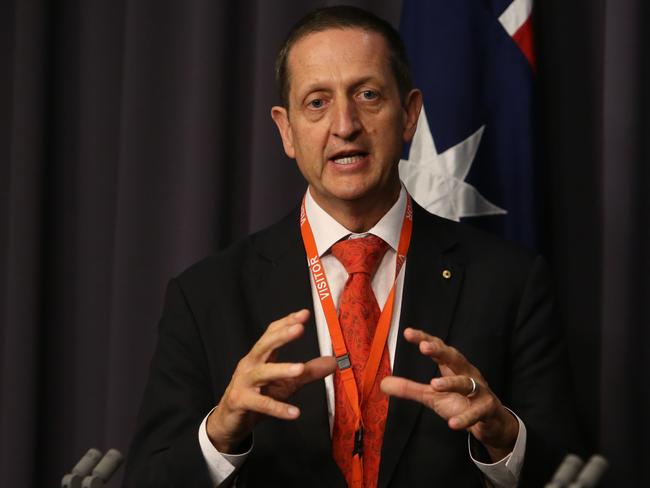Is Greta stressing out our kids?
Greta Thunberg’s emotional public comments spurred plenty of angry debate among adults last week but an internationally renowned clinical psychiatrist is confident our kids are coping very well with the teen’s apocalyptic predictions.

Opinion
Don't miss out on the headlines from Opinion. Followed categories will be added to My News.
- The antiheroes making evil the new black in movies
- ‘Bogan’ Bachelorette Angie ready to break some hearts
Greta Thunberg’s emotional public comments spurred plenty of angry debate among adults last week but an internationally renowned clinical psychiatrist is confident our kids are coping very well with the teen’s apocalyptic predictions.
Children have always had to process doomsday speech and political fearmongering, according to Sydney University psychiatry professor and co-founder of Headspace, Ian Hickie. “All generations have faced new threats,” the co-director of Sydney University’s Brain and Mind Centre and Child Behaviour Research Clinic said. “This is not new. Greta is today’s teenage zealot — today’s Joan of Arc.

“The generation I grew up in had to deal with (the fear of) the nuclear bomb wiping us all out — of someone hitting the button, of the Cold War ending the world, (also) that the world was going to end ecologically due to overpopulation, then due to the pollution of our environment. The generation now coming into adulthood and turning 18 has grown up as the post September 11 generation where the threat was from perceived terrorists,” said Prof Hickie, rattling through a long list of catalysts tipped to bring about human extinction — from world wars to the millennium bug. “This is normal human behaviour.”
The task of processing Thunberg’s alarming and alarmist comments falls not to children but to their parents and the adults raising them — as has always been the case.
Providing parents and communities kept their heads and explained what is happening in a rational, measured and age-appropriate manner, Thunberg’s distress will not negatively impact our kids or increase their anxiety, the academic said reassuringly.
“A discussion with five or six-year-olds about climate change and the future actually has little meaning unless their parents and their communities are very distressed,” Prof Hickie said.
“These children see the world on TVs and screens, violent images, terrorism, threats … when things are distant, spoken about in the future, they’re not tangible. As long as those around them are behaving sensibly, they’re unlikely to be distressed.”

Older children and teenagers are different, he said.
“The thing about Greta is she appeals most directly to teenagers. Teenage brains take emotional cues from other teenagers. It’s a time of life when actually listening to your friends is more important than listening to your parents, or anyone else,” the mental health expert said.
“Greta isn’t presenting a quiet, rational discussion. She’s very upset and she’s very angry with the issues that are running in the public domain.”
The young environmentalist’s passion is overwhelmingly positive, the academic said, though he understands how some might be concerned Thunberg is being exploited by the environmental movement and hopes any distress she is experiencing is being moderated by her parents and adult supporters.
“It’s really good to have teenagers engaged with the political and social process,” he said. “The last thing we want is for teenagers to be disengaged. Out of (feelings of) anxiety, hopelessness and real mental harm, detachment is far worse. Things that teenagers care about, they get distressed about and she’s an active player by choice.”
While anxiety in young children is natural, there is no evidence it is on the rise. Only awareness has increased.
In fact, suicide rates among youth have declined since the 1990s.
“Youth suicide was higher in the 1990s before we had social media,” Prof Hickie said, confirming suicide rates in the 1990s were twice what they are now although worryingly he revealed in the past five years they had risen among younger groups of teenagers.
The only player in the Thunberg debate Prof Hickie feels is not acting in a predictable and normal manner is American President Donald Trump. “The appropriate adult response is to actually recognise Greta’s distress and then provide a more mature context,” he said. “Trump demeaning her or belittling her on Twitter has to be the worst possible adult response. Possibly even more immature than the people exploiting her teenage emotionality. It’s Year 10 behaviour.”
PROFESSOR’S TIPS FOR PARENTS DEALING WITH WORRIED KIDS
PARENTS, educators and politicians should remain rational and calm when explaining the climate change debate to children and point out positive change is occurring — albeit slower than some might hope.
Prof Ian Hickie said it was reasonable to reassure children the world isn’t about to end: “It’s not the stroke of midnight. A catastrophic event is not about to happen. At the heart of anxiety management is putting things into context in time and place.”
His other tips for calming worried children include:
• Don’t say “don’t worry”: “Telling people not to worry about things they’re worrying about, is not helpful. If someone says ‘don’t worry’ when it’s obvious that the world around you is worried, ‘don’t worry’ is unhelpful.”
• Give context: “The media gives the impression that (crises) are happening everywhere all the time, and they’re not. Although we have had (worrying) incidents happen in Australia, we don’t have to be fearful every day in every place so we moderate that response and our own anxiety goes down.”

• Respond in a real and tangible way: “The most appropriate response to anxiety in that situation is to take action. People are most fearful when they perceive there’s a threat but there’s no action. We need to respond in our families and in our communities. This might just be pointing out rationally what’s going on — that the world is moving to renewable resources, that the scientific community has reached consensus, that new technologies are being deployed.”
• It is the role of teenagers to challenge. Let them: “They are emotional in their response to the situation. They’re aroused, they’re upset and they’re not convinced that their parents get it right.”
• Teach anxiety-coping strategies: “We’re lagging behind on this in primary schools, particularly in children aged nine and above, and also with their parents.”
• Don’t turn off the television and throw away the phone: “Technology is our friend. There are plenty of apps to help manage anxiety and plenty of information available about positive environmental change.”
annette.sharp@news.com.au
Twitter @InSharpRelief
